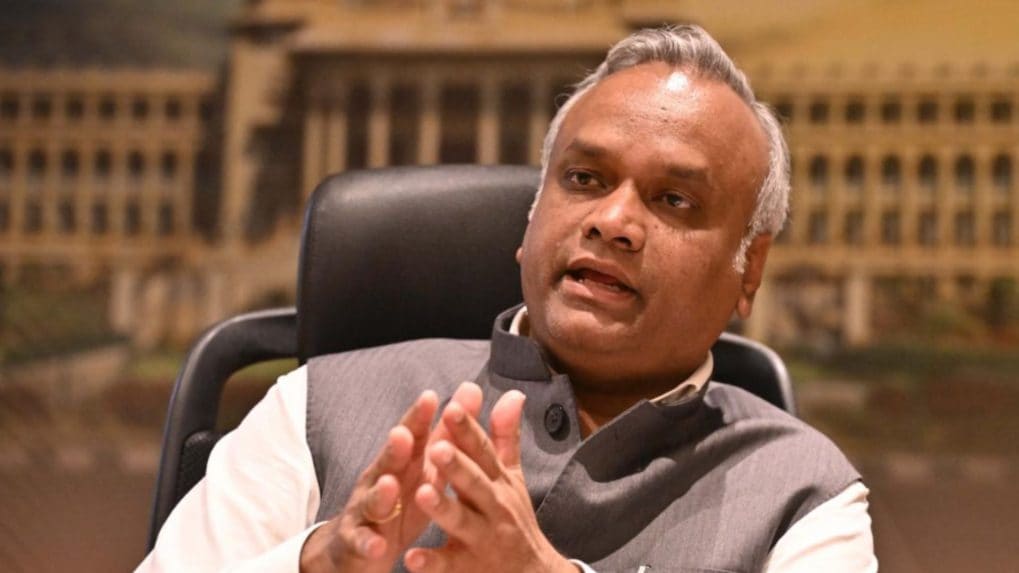Advertising
From Pink Slips to Silent Sidelining: Inside adland’s layoff and anxiety crisis

The Union government’s move to impose a blanket ban on Online Real Money Gaming (RMG) has drawn sharp criticism from Karnataka’s Minister for IT, Biotechnology, and Science & Technology, Priyank Kharge, who termed it a “knee-jerk policy decision” that threatens jobs, revenue, and India’s digital innovation ecosystem.
The government is set to table The Promotion and Regulation of Online Gaming Bill, 2025 in Lok Sabha today which puts a blanket ban on real money gaming companies operating legitemately in India.
Kharge via his official X handle pointed out that India currently earns over ₹20,000 crore annually through GST and income tax from the RMG sector. “A ban would deprive states of this crucial revenue stream,” Kharge warned.
The minister highlighted the severe impact on employment and startups. According to him, more than 2,000 gaming startups and over two lakh jobs across IT, AI, and design risk being wiped out if the industry is shut down. “This will push India’s gaming talent pool abroad and stifle entrepreneurship at home,” he added.
Kharge also noted that the sector has attracted ₹23,000 crore in foreign direct investment (FDI) over the past five years, investments that could dry up if India dismantles its own digital industry. Beyond jobs and investments, the wider ecosystem—which spends nearly ₹7,000 crore annually on advertising, data centres, sponsorships, and cybersecurity—is at risk of collapse.
He cautioned that banning RMG will not address concerns around addiction or suicides. Instead, it could drive users to offshore illegal platforms worth over ₹8.2 lakh crore annually, where the government has no oversight. “Such unregulated sites pose serious risks of money laundering, terror financing, and data theft. Even the FATF and Rashtriya Raksha University have warned against this,” Kharge stressed.
The minister also questioned the Centre’s timing given that the Supreme Court is still deliberating whether online gaming regulation falls under the purview of the Centre or the states. “Why the rush to ban now?” he asked.
Kharge argued that prohibition is not a solution and called for a balanced regulatory framework. Measures such as regulating skill-based platforms, enforcing IT Rules 2021, and whitelisting legitimate operators, he said, would safeguard jobs, revenue, user safety, and national security while supporting global innovation.
“A blanket ban will not only lead to massive revenue loss but will fuel illegal markets that may threaten national security. Regulation, not prohibition, is the way forward,” Kharge concluded.
Earlier, Kharge had raised alarm over a growing migration of Indian online gamers to foreign servers in the wake of steep taxation and weak enforcement, warning that the trend is undermining both state oversight and consumer protection.
Speaking during Karnataka Legislative Assembly discussion on the online gaming menace, Kharge said India’s gaming landscape is massive — nearly 590 million gamers, of which about 140 million are paying players. But he cautioned that the government’s recent 28% GST levy on the sector, imposed through the GST Council, has triggered an exodus.
“Our people have stopped playing on our servers. They are now playing on Eastern European, South American, and Chinese servers,” Kharge told the House. “Earlier, at least if we had controlled it, we would know who is running it and where they are playing. Then the police could go and take action. Now, their first advertisement is ‘No GST, ₹1 lakh in your account, no KYC.’ And our players are shifting there.”
Kharge warned that once players move to such unregulated overseas platforms, they become vulnerable to fraud with no legal recourse. “If they are cheated, no one can do anything because we don’t know who they are or where they are,” he said.
The minister emphasised that games of skill — such as Sudoku, chess, and fantasy sports — should not involve betting, and called for a coordinated effort between the central and state governments to create a robust legal framework. “If both levels of government unite and do this, regulation is possible. Otherwise, it will always be difficult,” he noted.
Kharge’s intervention came amid a larger debate initiated by BJP legislator S. Suresh Kumar, who pressed the government on delays in lifting the stay on the 2021 amendment to the Karnataka Police Act. That amendment had sought to bring all online wagering and betting, including games of chance, under state regulation, but was struck down by the Karnataka High Court. The Congress-led government has since appealed to the Supreme Court.
From purpose-driven work and narrative-rich brand films to AI-enabled ideas and creator-led collaborations, the awards reflect the full spectrum of modern creativity.
Read MoreLooking ahead to the close of 2025 and into 2026, Sorrell sees technology platforms as the clear winners. He described them as “nation states in their own right”, with market capitalisations that exceed the GDPs of many countries.